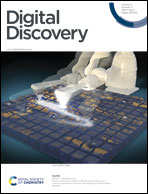Discovery of novel reticular materials for carbon dioxide capture using GFlowNets†
Abstract
Artificial intelligence holds promise to improve materials discovery. GFlowNets are an emerging deep learning algorithm with many applications in AI-assisted discovery. Using GFlowNets, we generate porous reticular materials, such as Metal Organic Frameworks and Covalent Organic Frameworks, for applications in carbon dioxide capture. We introduce a new Python package (matgfn) to train and sample GFlowNets. We use matgfn to generate the matgfn-rm dataset of novel and diverse reticular materials with gravimetric surface area above 5000 m2 g−1. We calculate single- and two-component gas adsorption isotherms for the top-100 candidates in matgfn-rm. These candidates are novel compared to the state-of-art ARC-MOF dataset and rank in the 90th percentile in terms of working capacity compared to the CoRE2019 dataset. We identify 13 materials with CO2 working capacity outperforming all materials in CoRE2019. After further analysis and structural relaxation, two outperforming materials remain.

- This article is part of the themed collection: AI for Accelerated Materials Design, NeurIPS 2023


 Please wait while we load your content...
Please wait while we load your content...